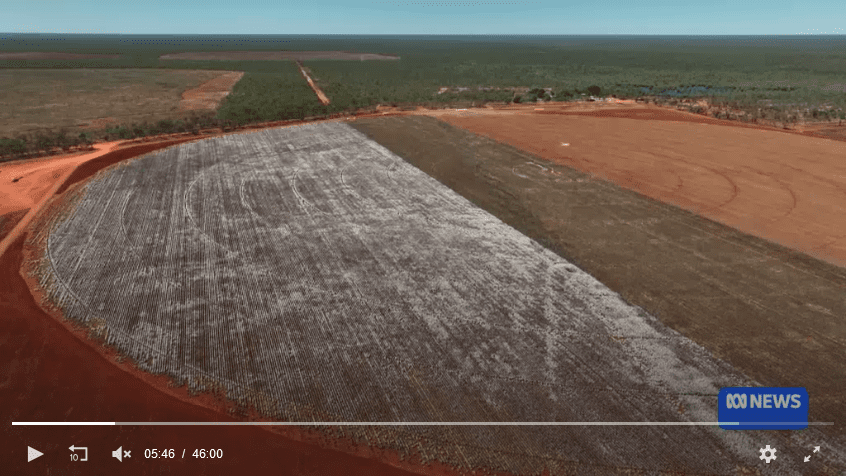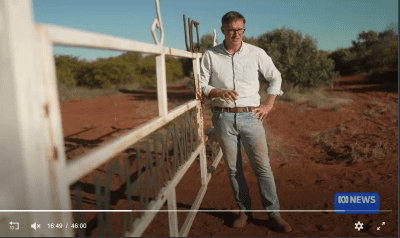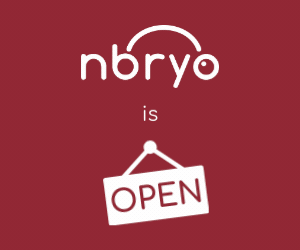
Four Corners’ Water Grab episode includes aerial footage of cotton grown under centre-pivot irrigation in the NT. Source: ABC
AUSTRALIA’S peak cotton body, Cotton Australia, has been quick to respond to claims made by the Australian Broadcasting Corporation’s Four Corners program about the developing cotton industry in the Northern Territory.
In its episode aired last night and entitled Water Grab, Four Corners made several claims relating to the growing of cotton using unregulated and free underground water, and plans to build dams on leased land on which to harvest overland flows.
The episode included file footage of Tipperary Station chair Allan Myers, general manager David Connelly and his brother and Tipperary cotton manager Bruce Connolly speaking about NT cotton, and the gin at Katherine, in which Tipperary is a major investor, that opened last year.
File footage also includes an interview with former NT Farmers Association chief executive officer Paul Burke.
New footage showed several properties, namely Paspaley Properties’ Dry River Station, which the episode claims is growing cotton, and the Malcolm Harris-owned Ucharonidge Station, which is openly growing cotton.

Screenshot of Four Corners reporter Angus Grigg at the gate of Ucharonidge Station. Image: ABC
“Malcolm Harris says the cotton crop is being grown for its seed, which can be fed to cattle,” reporter Angus Grigg said in the report.
However, veterinarian, environmentalist, and independent candidate for the seat of Katherine in the NT election being held on Saturday Sam Phelan refuted this claim, saying that cottonseed was only around 15 percent of the value of the crop.
“People are growing this for the fibre; the cottonseed is a byproduct,” Dr Phelan said.
The episode also claims some NT land has been cleared without a prior permit being issued, ostensibly for the purpose of growing cotton, and that while NT cotton is being promoted as a dryland crop, irrigation systems are being put in to support it.
While the episode mentions a number of NT leaseholders for their alleged involvement in cotton production, it is harshest on NT Government policy for its lack of regulation on land-use and water entitlements to date.
NT Minister for Environment, Climate Change and Water Security Kate Worden was interviewed at length in the program to advocate the NT Government’s position on policy around the growing of cotton, and irrigation generally.
The program showed or stated attempts to speak with a number of NT leaseholders, none of which resulted in on-air interviews.
Thumbs down from Cotton Australia
In its statement issued today, Cotton Australia said it decided not to take up the opportunity to engage with Four Corners for the Water Grab program.
“In our last engagement with Four Corners, the Australian Communications and Media Authority found that ABC’s Four Corners breached its own Code of Practice on the issue of due impartiality and unduly favouring one perspective in a 2019 story on water infrastructure where cotton was a focus,” Cotton Australia said.
“Due to this and other experiences with Four Corners, Cotton Australia took the deliberate decision not to engage with them on this program given their past bias.”
 That episode, entitled Cash Splash, aired on 8 July 2019, and looked at Federal Government expenditure on water infrastructure schemes in the Murrumbidgee Valley under the Murray-Darling Basin Plan.
That episode, entitled Cash Splash, aired on 8 July 2019, and looked at Federal Government expenditure on water infrastructure schemes in the Murrumbidgee Valley under the Murray-Darling Basin Plan.
Following is Cotton Australia’s response to the Water Grab episode:
Cotton Australia is extremely disappointed at the conduct of ABC’s Four Corners program in delivering another attack on the cotton industry in last night’s story on cotton in the Northern Territory.
Again, last night, Four Corners portrayed a one-sided view of the industry, disregarded legitimate scientific research, made conclusions based on repeated claims by activists, promoted the electoral ambitions of a key opponent of the industry and irresponsibly raised alarmist claims about possible catastrophic outcomes and a devastated tourism industry.
The main claims are repeated below with the cotton industry responses to each allegation.
Claim: Unsustainable levels of water are being taken from aquifers threatening the Roper River, which may run dry.
Response: There is no independent evidence to validate this claim. The CSIRO has published its own report which contradicts suggestions the Roper River system will run dry. It is available here.
The Chief Executive of the Amateur Fishermen’s Association of the Northern Territory, David Ciaravolo rejects the Roper River claims.
In communication with the ABC’s Matt Brann Mr Ciaravolo states: “I have been on the Mataranka Water Advisory Committee for the past seven years. And let me tell you, as an advocate for barramundi fishing and the Roper River, I have no fear that current or imminent water rules will lead to the Bitter Springs drying up, nor to the Roper River ceasing to flow.”
He says new water regulations have made and will make things better, not worse.
Claim: Mataranka water levels are dropping because of irrigation.
Response: This claim is unsubstantiated. Long-term monitoring and assessments show that ground water levels are increasing despite extraction commencing in the early 2000’s.
Claim: A 10GL water license is being given away at Larrimah to grow crops including 800 Ha of cotton.
Response: There is an application which nominates several crops, including 800 ha of cotton and that application is not yet finalised. This is a matter for the individual grower and the government to determine, considering their stringent water regulations.
Claim: The suggestions about economic benefit from Cotton to the Territory are spurious with a questionable benefit to the NT.
Response: This year, around $38 million was generated by the NT cotton industry through cotton, with most of that money trickling down into the local economy. Transport operators, contractors and farming supply companies are already benefiting from that economic activity and additional jobs have been created.
Claim: The tourism sector could be put at risk by irrigators growing cotton.
Response: This is scaremongering. There is no independently validated evidence to support this and only 4.5pc of the cotton crop is irrigated with over 95pc rain fed.
Claim: Farmers are using pastoral leases to grow cotton when they shouldn’t.
Response: The regulator and the relevant Minister disagree, stating the practice is legal. The pastoral purposes guide is available here.
Claim: The NT Government is ignoring scientists with their concerns.
Response: This is for the Northern Territory Government to respond. Note that most of the Board at activist group Environment Centre NT are also Charles Darwin University researchers, staff and students.
Claim: Indigenous owners are being ignored.
Response: The Northern Territory Government states First Nations people have a pivotal role in water access due to the high proportion of Aboriginal Land in the Northern Territory (both Land Rights and Native Title), and regardless of their Traditional Owner status, local people are actively consulted with through water allocation planning processes.
All pastoral development applications, land or water undergo a public submission period. During this period all relevant government and non-government organisations can make comments on the proposed submission that the Consent Authority must then consider in their decision-making process, this includes ground truth visits from members of the Pastoral Land Board. All Indigenous stakeholders are given ample opportunity, like all others, to make comment through the same process.
Claim: Some growers have nominated hay when applying for permits to clear land and for water applications and yet they grow cotton.
Response: In some cases, growers have held historic and long-term rights and entitlements to enable them to engage in agricultural cropping and their decisions about which crops to grow can change in a rotational cropping system. Cotton has only emerged as a viable option recently and so it is understandable that some may have nominated other crops when originally lodging their applications.
Claim: The cotton industry sought a new category of water license regarding a practice known as floodplain harvesting (overland flow) with a view to the establishment of dams.
Response: Cotton Australia can categorically state that it has never sought to influence the overland flow policy and nor is it aware of any other cotton representative body doing so.
Cotton Australia’s facts about the NT cotton industry
- It currently has 13 cotton growers;
- 12,982ha planted, including 575ha under irrigation;
- Water used is from existing water allocations that previously would have been used to grow other crops;
- Any water used for irrigating cotton is from existing water allocations using groundwater;
- There are 407 water licences for agriculture in existence; only nine involve cotton;
- Currently there is no irrigated cotton grown with water extracted from a river or from wet-season flows;
- At this stage there are no applications from cotton growers for wet-season flow water;
- Around 0.01pc of Australian cotton is grown in the NT.
